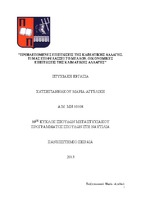Προβλεπόμενες επιπτώσεις της κλιματικής αλλαγής : τι μας επιφυλάσσει το μέλλον. Οικονομικές επιπτώσεις της κλιματικής αλλαγής

Master Thesis
Συγγραφέας
Χατζηγιαννακού, Μαρία-Αγγελική
Ημερομηνία
2013Προβολή/
Θεματική επικεφαλίδα
Κλιματικές αλλαγές -- Οικονομικές απόψεις ; Κλιματολογικές αλλαγές -- Οικονομικές απόψεις ; Ατμόσφαιρα -- Ρύπανση -- Οικονομικές απόψεις ; Climatic changes -- Economic aspectsΛέξεις κλειδιά
Στρατηγικές αντιμετώπισης ; Προσαρμογή ; Μετριασμός ; Adaptation strategies ; Mitigation strategies.Περίληψη
Η κλιματική αλλαγή που προκαλείται από την αύξηση των αερίων του θερμοκηπίου στην ατμόσφαιρα, αναμένεται να επηρεάσει αρνητικά ανθρώπους, δραστηριότητες, περιβάλλοντα και οικοσυστήματα. Οι επιπτώσεις της κλιματικής αλλαγής έχουν ήδη αρχίσει να γίνονται αισθητές με την αύξηση της θερμοκρασίας, τη συνεπαγόμενη τήξη των πάγων και την άνοδο της στάθμης της θάλασσας, την αλλαγή στα μοτίβα των βροχοπτώσεων, τα συχνότερα και εντονότερα καιρικά φαινόμενα κ.α. Είναι πλέον βέβαιο πως η αλλαγή του κλίματος είναι ανθρωπογενής.
Οι επιπτώσεις της κλιματικής αλλαγής αναμένεται να επιβαρύνουν τομείς όπως της υγείας, της γεωργίας, της περιβαλλοντικής σταθερότητας και της σταθερότητας των βιοτόπων, της διαβίωσης των ειδών, τον οικονομικό, τον κοινωνικό, τον τομέα της πληθυσμιακής ισορροπίας και ψυχολογίας, τους τομείς σίτισης και πόσιμου νερού καθώς και της γεωγραφικής και πληθυσμιακής κατανομής.
Ο πολυσύνθετος τομέας των οικονομικών της κλιματικής αλλαγής έχει απασχολήσει πολλούς έγκριτους οικονομολόγους. Σύμφωνα με τον N. Stern (2006) και τον R. S. Tol (2009), η σημαντικότερη οικονομική συνέπεια της αλλαγής του κλίματος είναι η δυσανάλογη επιβάρυνση των φτωχότερων πληθυσμιακών στρωμάτων, ενώ οι πλουσιότερες χώρες, που στην ουσία ευθύνονται για αυτή την αλλαγή, δεν θα αποζημιώσουν στον βαθμό που θα έπρεπε τους πιο αδύναμους. Επομένως, θα πρέπει να αναπτυχθούν μηχανισμοί όπως π.χ. ειδικές φορολογήσεις ρύπων και παροχή τεχνικοοικονομικής βοήθειας όπου χρειάζεται.
Η άμεση και αποτελεσματική δράση για την αποφυγή μιας περεταίρω και εν δυνάμει, καταστροφικής κλιματικής αλλαγής, μπορεί να επιτευχθεί με ένα συνδυασμό τακτικών προσαρμογής και μετριασμού, με εργαλείο τα ειδικά σενάρια για τη κλιματική αλλαγή και την ευρεία χρήση ανανεώσιμων πηγών ενέργειας.
Προτείνω πώς, η κάθε στρατηγική πρέπει να αξιολογείται με βάση ένα νέο ηθικό πλαίσιο, το οποίο θα βρίσκεται σε αντιστοιχία με την αίσθηση ότι ο άνθρωπος έχει ηθική υποχρέωση να προστατεύει τη φύση.


